
Muhammad Ali was an American professional boxer and activist. Nicknamed "the Greatest", he is regarded as one of the most significant sports figures of the 20th century and is often regarded as the greatest heavyweight boxer of all time. He held the Ring magazine heavyweight title from 1964 to 1970. He was the undisputed champion from 1974 to 1978 and the WBA and Ring heavyweight champion from 1978 to 1979. In 1999, he was named Sportsman of the Century by Sports Illustrated and the Sports Personality of the Century by the BBC.

George Edward Foreman is an American former professional boxer, entrepreneur, minister, and author. In boxing, he competed between 1967 and 1997 and was nicknamed "Big George". He is a two-time world heavyweight champion and an Olympic gold medalist. As an entrepreneur, he is known for the George Foreman Grill.
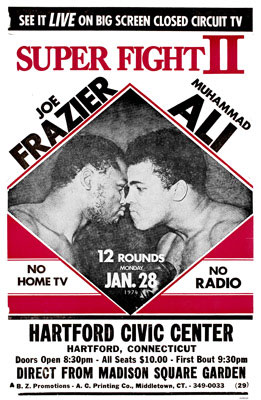
Muhammad Ali vs. Joe Frazier II, billed as Super Fight II, was a professional boxing match contested on January 28, 1974, for the NABF heavyweight title. The second of the three Ali–Frazier bouts, it took place at Madison Square Garden in New York City.
Richard Dunn is an English former heavyweight boxer who was the British (1975–76), European (1976) and Commonwealth (1975–76) Champion. He unsuccessfully challenged Muhammad Ali for the world heavyweight title in 1976.
Rhee Jhoon-goo, commonly known as Jhoon Rhee, was a Korean-American taekwondo partitioner. He is widely recognized as the "father of American taekwondo" for introducing this martial art to the U.S. after arriving there in the 1950s. He was a 10th dan black belt and held the title of Grandmaster.

This article covers the boxer Muhammad Ali's appearances in media and popular culture.
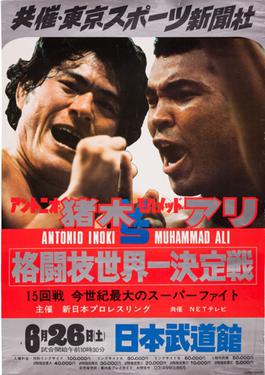
Muhammad Ali vs. Antonio Inoki, billed as The War of the Worlds, was a fight between American professional boxer Muhammad Ali and Japanese professional wrestler Antonio Inoki, held at the Nippon Budokan arena in Tokyo, Japan, on June 26, 1976. At the time, Ali had come off a knockout victory over Richard Dunn in May and was the undisputed heavyweight boxing champion. Inoki, who had been taught catch wrestling by wrestler Karl Gotch, was staging exhibition fights against champions of various martial arts, in an attempt to show that pro wrestling was the dominant fighting discipline.
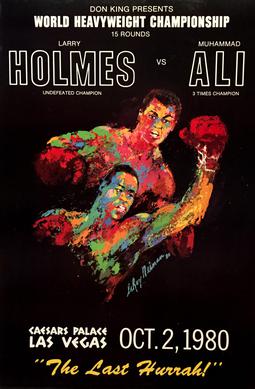
Larry Holmes vs. Muhammad Ali, billed as "The Last Hurrah!", was a professional boxing bout contested on October 2, 1980, in Las Vegas for the WBC and vacant The Ring heavyweight championships.

Muhammad Ali vs. Ken Norton, billed as The Fight, was a professional boxing match contested on March 31, 1973, for the NABF heavyweight championship.
Muhammad Ali vs. Jean-Pierre Coopman was a professional boxing match contested on February 20, 1976, for the undisputed heavyweight championship. Ali won the fight after knocking out Coopman in the fifth round.
Muhammad Ali vs. Joe Bugner was a professional boxing match contested on February 14, 1973.
Muhammad Ali vs. Jimmy Young was a professional boxing match contested on April 30, 1976, for the undisputed heavyweight championship. Ali won the bout through a unanimous decision on points. This bout was aired live in primetime on ABC with Howard Cosell calling the action from the Capital Centre in Landover, Maryland.
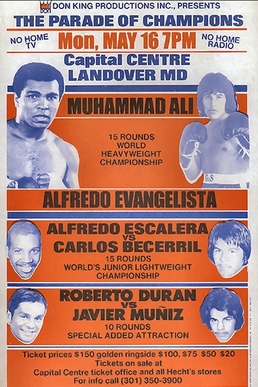
Muhammad Ali vs. Alfredo Evangelista was a professional boxing match contested on May 16, 1977, for the undisputed heavyweight championship. Ali won the bout through a unanimous decision on points. The fight was held in the Capital Centre before a crowd of over 12,000 at the Capital Centre, along with a prime time broadcast on ABC.
Muhammad Ali vs. Rudie Lubbers was a professional boxing match contested on October 20, 1973, at Gelora Senayan Main Stadium, Jakarta, Indonesia.

Muhammad Ali vs. Bob Foster, billed as The Sound and the Fury, was a professional boxing match contested on November 21, 1972, for the NABF heavyweight championship.
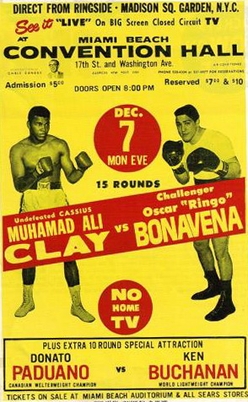
Muhammad Ali vs. Oscar Bonavena was a professional boxing match contested on December 7, 1970, for the NABF and Lineal heavyweight championship at Madison Square Garden in New York City on December 7, 1970.
Muhammad Ali and Cleveland Williams fought each other in a championship boxing match at the Astrodome in Houston, Texas on November 14, 1966. Ali won the bout through a technical knockout in the third round. Many experts and boxers, including Mike Tyson, regard Ali's performance in this fight to be the finest of his boxing career. This was also the fight in which Ali made famous the move he called the "Ali shuffle".
Cassius Clay vs. Sonny Banks was a professional boxing match contested on February 10, 1962.

Leon Spinks vs. Muhammad Ali II,, billed as Battle of New Orleans, was a professional boxing match contested on September 15, 1978, in New Orleans for the WBA and The Ring heavyweight championships.

Muhammad Ali was a boxer who mastered the rope-a-dope fighting technique. He is widely regarded by many boxing commentators and historians as the greatest heavyweight boxer of all time. Boxing magazine The Ring named him number one in a 1998 ranking of greatest heavyweights from all eras. In 1999, The Associated Press voted Ali the number one heavyweight of the 20th century.












